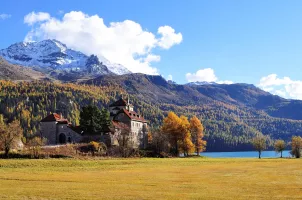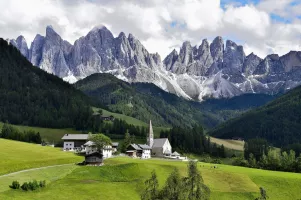Hungarian State Opera House Travel Guide
The Hungarian State Opera House is a renowned opera house located in Budapest, Hungary. Built-in the 19th century, this architectural masterpiece is a symbol of Hungarian culture and history. The opera house showcases a unique blend of Renaissance and Baroque styles, attracting music and architecture enthusiasts from around the world. Budapest, known as the "Paris of the East," is famous for its thermal baths, charming architecture, and vibrant nightlife.Top Attractions in Hungarian State Opera House
- Attend a spectacular opera or ballet performance
- Take a guided tour of the opulent opera house
- Explore the historic Andrassy Avenue
- Visit St. Stephen's Basilica
- Relax in the Széchenyi Thermal Bath
Hungarian State Opera House is Famous for
Its opulent architecture and world-class opera and ballet performances.Top Attractions in Hungarian State Opera House
- Immerse yourself in the grandeur of the Hungarian State Opera House
- Experience the cultural richness of Budapest
- Indulge in the city's culinary delights
- Enjoy a leisurely cruise on the Danube River
- Discover the historic Buda Castle
What's Great about Travelling to Hungarian State Opera House?
- Opera and ballet enthusiasts
- History and architecture lovers
- Cultural explorers
What's Not So Great about Travelling to Hungarian State Opera House?
- Travelers seeking beach destinations
- Those looking for a budget-friendly trip
Travel Tips for Hungarian State Opera House
- Check the opera house schedule in advance
- Book tickets for performances early
- Explore the surrounding attractions on foot
- Respect the local customs and traditions
Important Hungarian State Opera House trip information
- Ideal Duration: 3-4 days to explore Budapest and enjoy opera performances
- Best Time to Visit: Spring and Fall for pleasant weather
- Nearby Airports and Railway Stations: Budapest Ferenc Liszt International Airport and Budapest Keleti Railway Station
Per Person
1,66,499
*EXCLUDING APPLICABLE TAXES 4.5 Ratings
( 22 Reviews )
( 22 Reviews )
Per Person
2,17,599
*EXCLUDING APPLICABLE TAXES 4.5 Ratings
( 22 Reviews )
( 22 Reviews )
FAQ's on Hungarian State Opera House
Q1: What is the best time to visit Hungarian State Opera House?
The best time to visit the Hungarian State Opera House is during the performance season, which typically runs from September to June. This period allows you to experience the full range of opera and ballet productions. Additionally, visiting in the spring or fall offers pleasant weather for exploring Budapest's cultural scene. The holiday season around Christmas and New Year also brings special performances and decorations to the Opera House.
Q2: Do I need a visa to travel to Hungarian State Opera House?
Hungary is part of the Schengen Area, which allows many tourists to enter without a visa for stays of up to 90 days. However, visa requirements may vary based on your nationality. It is advisable to check the latest visa regulations before traveling to the Hungarian State Opera House.
Q3: What are the must-visit attractions in Hungarian State Opera House?
The Hungarian State Opera House itself is a must-visit attraction, renowned for its stunning architecture and world-class performances. In Budapest, other top attractions include the Buda Castle, Fisherman's Bastion, Parliament Building, and the thermal baths. Don't miss exploring the historic neighborhoods of Pest and Buda, as well as taking a cruise on the Danube River for breathtaking views of the city.
Q4: Is Hungarian State Opera House a safe place to travel?
Hungarian State Opera House and Budapest, in general, are considered safe for travelers. However, like any major city, it is advisable to be cautious of pickpocketing in crowded tourist areas. Avoid dark alleys at night and be mindful of your belongings. It is also recommended to use licensed taxis and be aware of common scams targeting tourists.
Q5: What is the local currency in Hungarian State Opera House and can I use credit cards?
The local currency in Hungary is the Hungarian Forint (HUF). While credit cards are widely accepted in major establishments like hotels, restaurants, and shops in Budapest, it is advisable to have some cash on hand for smaller vendors and local markets. ATMs are readily available throughout the city for currency exchange.
Q6: What is the local cuisine like in Hungarian State Opera House?
Hungarian cuisine is known for its hearty and flavorful dishes. Must-try specialties include goulash, paprikash, lángos (fried dough), and chimney cake. Vegetarians can enjoy dishes like lecsó (pepper and tomato stew) and töltött káposzta (stuffed cabbage). Don't miss trying Hungarian wines and pálinka (fruit brandy) for a true taste of the local gastronomy.
Q7: What transportation options are available in Hungarian State Opera House?
Budapest offers a well-connected transportation system, including buses, trams, metro, and taxis. The Opera House is easily accessible by public transport, with nearby metro stations and bus stops. You can also explore the city by walking or cycling, especially along the Danube River. Car rental services are available for those wanting to venture outside the city.
Q8: Are there any cultural norms or etiquette I should be aware of when visiting Hungarian State Opera House?
When visiting the Hungarian State Opera House, it is important to dress appropriately for performances, with formal or smart-casual attire recommended. Respect local customs by addressing people with proper titles and greetings. Tipping is common in restaurants and for services like taxis. Hungarians value punctuality, so arrive on time for performances or appointments. Learning a few basic Hungarian phrases can also show respect for the local language and culture.
Q9: I am a travel agent. How can I buy travel leads of Hungarian State Opera House?
Register yourself as a travel agent at agents.tripclap.com and then you can buy travel leads to Hungarian State Opera House once your account is approved. For more details contact our support team at +91-8069186564 or support@tripclap.com


